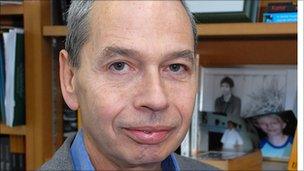Frank Furedi: Five things I have learned
- Published

'Think about your motives', Professor Furedi tells parents
In our occasional series on key figures in education and family, sociologist and author Frank Furedi reveals the most important things he has learned in his life.
Name: Frank Furedi
Occupation: Professor of Sociology at University of Kent, and author of books including Paranoid Parenting, Politics of Fear, Where Have All the Intellectuals Gone?, Therapy Culture, Culture of Fear and Wasted: Why Education is not Educating
Education: BA in international relations at McGill University, Montreal, then studied African politics at the School of Oriental and African Studies in London and received his doctorate from the University of Kent.
Lives: Faversham, Kent
Born: 1947, Budapest, Hungary
Family life: Married to Ann; says he is "attempting to father" his 15-year-old son, Jake
Unusual fact: A former student radical, in the 70s, he was the founder and chairman of the Revolutionary Communist Party.
1. Listen - because you can learn from anybody.
I have learnt that it is a mistake not to listen to people, even people who you don't take seriously, because those who appear ignorant can surprise you with their insights into life. Even if you disagree with what they say, through listening you can learn what it is that leads them to adopt an erroneous conclusion. That's one way of learning about other people's experiences and about life.
A genuine listening strategy is surprisingly difficult to acquire - but it is well worth the effort.
2. Question everything
This is one of the things I found most difficult to do. It's very easy to fall back into old ways and repeat things you have done in the past. When I simply follow someone else's opinion or unthinkingly repeat what I thought previously, I quite often end up realising that I'm on the wrong track. However, through questioning my beliefs and those of others it soon becomes evident that what worked yesterday may be inappropriate in a different context.
Moreover, it's only in the course of questioning that you make progress in developing and refining your ideas. I have really come to appreciate Socrates. He was always annoying everyone by going to the market and asking questions. But those questions often led to greater clarity.
3. Rely on your intuition
We live in a world where we are bombarded by conflicting instructions through the media. As a father and a teacher I have been forced to rely on my intuition. I have learned to use my intuition even when people that I respect point me in a very different direction. Intuition is really your experience codified - insights gained through the working of your emotions and ideas. It doesn't mean you are always right but it does put you in the right direction.
4. Always reflect on your motives when you are dealing with your children
Parents make big emotional investments in their children so that sometimes they confuse their own needs with those of their children. It is easy to overlook the fact that sometimes what we want for ourselves is not what our kids need.
There is so much pressure to live our lives through our children. That's why we need to pause and have a reality check. We need to think about our motives by asking the question: "Am I doing this for them or for myself?" You may still end up doing something that meets your own needs rather than those of your child, but at least you will not be deluding yourself.
5. Things are never as bad as they seem.
This is something I learned later in life. I was a micro-manager, always meeting deadlines, imagining that everything that could go bad would go bad. It is only relatively recently that I learned that the situation is rarely as bad as you imagine. We have a tremendous capacity for resilience, for bouncing back and not allowing our disappointments to overwhelm us.
Often what happens depends on how we respond to a problem. We can make a drama out of a crisis and feel sorry for ourselves for the next 10 years or we can find a strategy for moving on and looking for new opportunities. Moving on, always moving on, has become one of the key principles guiding my daily life.